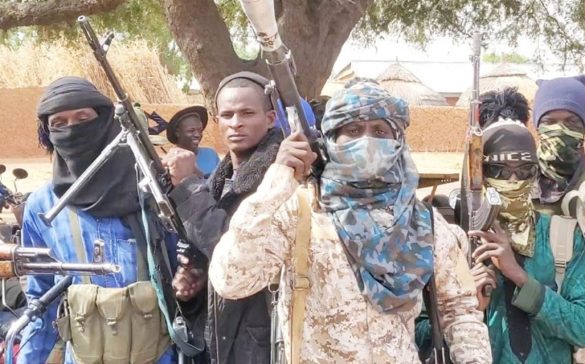Civilian Volunteer Forces Eliminate Notorious Bandit Commander Danbokolo, 173 others in Zamfara
(Gusau) Civilian vigilante forces in Shinkafi Local Government Area have successfully eliminated notorious bandit kingpin Kachalla Yellow Danbokolo alongside 173 of his fighters in a weekend operation that lasted several hours, community sources told MBT
Kachalla Yellow Danbokolo, widely regarded as the most dangerous bandit leader in the Northwest and described by locals as even more ruthless than his cousin Bello Turji, was killed alongside more than 173 of his fighters during coordinated attacks by Shinkafi volunteer forces over the weekend.
The operation, which security many describe as a “huge surprise,” has brought unprecedented relief to communities that have lived under the terror of Danbokolo’s reign for years. Unlike previous military operations, this civilian-led initiative appears to have struck at the very heart of the bandit hierarchy.
“The killing of Danbokolo will bring some peace and stability to Shinkafi and Zamfara at large,” said Abdullahi Shinkafi, a community leader who has witnessed the devastating impact of banditry on local populations. “This represents a turning point in our fight against these criminals who have held our communities hostage.”
Danbokolo, who sustained critical injuries during the initial assault, reportedly died over the weekend and was buried on Saturday. His death has triggered massive celebrations across Kurya District in Shinkafi Local Government Area, where residents had endured months of terror under his command.
The success of the civilian forces has particularly resonated with local communities who have grown frustrated with conventional security approaches. Mallam Salisu, a resident of Shinkafi, expressed his admiration for the vigilante forces’ achievement.
“These brave men have done what the military couldn’t do for years,” Salisu stated. “They have shown that when communities unite and take decisive action, even the most notorious criminals can be defeated. We are eternally grateful to these heroes who risked their lives for our freedom.”
The operation’s impact extends beyond Danbokolo’s elimination. Intelligence sources reveal that known loyalists of Bello Turji are now in disarray, with many seeking to surrender as they witness the collapse of their network’s leadership structure. Some foot soldiers have reportedly begun desperate attempts to negotiate amnesty deals.
Residents describe Danbokolo as “the man behind the “mask”—the true architect of terror operations while Turji served primarily as a spokesperson. His elimination has effectively decapitated the command structure of one of the region’s most organized criminal enterprises.
The volunteer forces’ success comes at a time when farming communities are preparing for the planting season. Local farmers have expressed hope that they will no longer be forced to pay “taxes” to bandits—a practice that has crippled agricultural productivity in the region.
A Case for Community Policing
The remarkable success of Shinkafi’s volunteer forces comes at a time when security experts are increasingly advocating for community-based policing models across Nigeria. Last week, during a roundtable dialogue organized by the Para-Mallam Peace Foundation in partnership with The Plateau Peace Practitioners Network in Jos, former Inspector General of Police Dr. Solomon Arase made a compelling case for regional policing that integrates local knowledge with national standards.
Delivering the keynote address, retired Inspector General of Police, Dr. Solomon Arase, advocated a regional policing model that blends national standards with localized knowledge to improve response time and community trust. Arase emphasized the critical importance of strengthening police-community relations as the foundation for effective security management.
The Zamfara success story validates Arase’s vision. Where conventional military operations had repeatedly failed to neutralize Danbokolo and his network, locally-organized civilian forces achieved decisive results within days. This outcome underscores the power of intimate local knowledge, community trust, and grassroots coordination that characterizes effective community policing.
Governor Caleb Mutfwang of Plateau State, speaking during the same Jos dialogue themed “Dialogue on Community Policing as a Panacea for Insecurity in Nigeria: The Case of Plateau State,” argued that Nigeria’s security challenges are fundamentally elite-created problems that require community-driven solutions.
“Communities that have lived peacefully together can suddenly be torn apart when the minds of the people are poisoned,” Mutfwang warned, emphasizing how elite manipulation often undermines natural community cohesion. His observation resonates with the Shinkafi experience, where local communities, when empowered and properly coordinated, demonstrated remarkable capacity for self-defense.
The governor’s emphasis on community ownership of security aligns perfectly with what unfolded in Zamfara. Rather than waiting for external intervention, Shinkafi communities took ownership of their security challenges and achieved results that had eluded conventional approaches for years.
As celebrations continue across affected communities, the success of Shinkafi’s volunteer forces provides compelling evidence for accelerating community policing initiatives nationwide, demonstrating that locally-driven security solutions can achieve what centralized approaches have struggled to accomplish.


